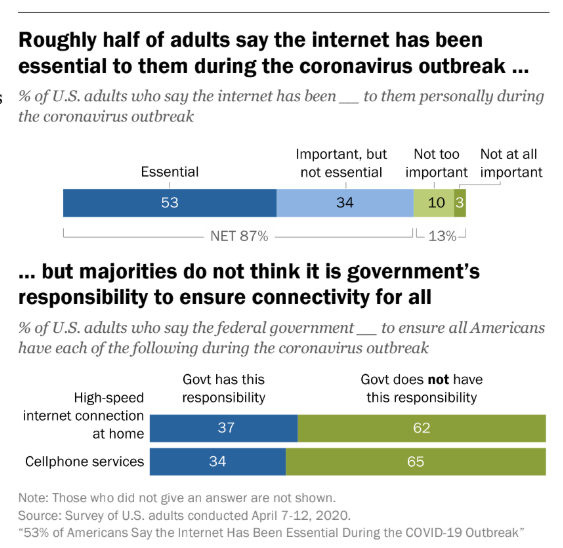Pew: Majority Say Universal Broadband Isn't Fed's Job During Pandemic

The smarter way to stay on top of broadcasting and cable industry. Sign up below
You are now subscribed
Your newsletter sign-up was successful
It will come as no surprise to most of the shelter-at-home population that a vast majority of people in a new Pew survey (87%) said the Internet has been important (34%) or essential (53%) to them personally during the pandemic.
But perhaps somewhat surprisingly, a clear majority (62%) say they don't think that it is the federal government's responsibility to make sure that all Americans have a high-speed internet connection at home during the COVID-19 outbreak, even though it may hinder how they perform everyday tasks in the "new normal."
Related: The Latest on COVID-19's Impact on Industry
There was a partisan divide over the digital divide, but still only about half of Democrats (52%) thought it was the government's job to insure a high-speed connection, and even fewer (45%) it was government's job to insure cellphone service. For Republicans, those were 22% and 21%, respectively.
Less than a third of the respondents (28%) said they worry about paying for their high-speed connection, and about a third of those with smartphones worry about paying their cellphone bills, though that worry over indexes for Hispanic and Black respondents and those with lower incomes. For example, more than half (54%) of Hispanic respondents said they worry about being able to pay.
Related: Groups Petition Congress for Broadband Billions
Hundreds of members of Congress and hundreds of civil society groups have been pressing Congress for billions of dollars in funding to close the digital divide and "homework gap" ASAP and make sure that lower income Americans and students.
The smarter way to stay on top of broadcasting and cable industry. Sign up below
For one thing, it is problematic for schools to move online if not all students have equal access to the internet or have to un-shelter to find a hotspot. Roughly one fifth (22%) of parents with children having to "home school" as it were said it was very or somewhat likely their kids will not be able to finish schoolwork at home because they don't have a "reliable" internet connection.
About the same one in five parents (21%) said it will be hard for their kids to study remotely because they don't have access to a home computer, and even more (37%) said that it was the school's responsibility to provide all students with a laptop or tablet if they were expected to attend school together, apart.
The study was conducted April 7-12 among 4,917 U.S. adults. The margin of error is plus or minus 2.1 percentage points.
Contributing editor John Eggerton has been an editor and/or writer on media regulation, legislation and policy for over four decades, including covering the FCC, FTC, Congress, the major media trade associations, and the federal courts. In addition to Multichannel News and Broadcasting + Cable, his work has appeared in Radio World, TV Technology, TV Fax, This Week in Consumer Electronics, Variety and the Encyclopedia Britannica.

